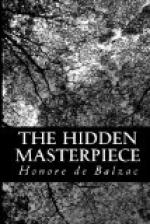“It is not yet equal to my Beautiful Nut-girl; still, one can put one’s name to such a work. Yes, I will sign it,” he added, rising to fetch a mirror in which to look at what he had done. “Now let us go and breakfast. Come, both of you, to my house. I have some smoked ham and good wine. Hey! hey! in spite of the degenerate times we will talk painting; we are strong ourselves. Here is a little man,” he continued, striking Nicolas Poussin on the shoulder, “who has the faculty.”
Observing the shabby cap of the youth, he pulled from his belt a leathern purse from which he took two gold pieces and offered them to him, saying,—
“I buy your drawing.”
“Take them,” said Porbus to Poussin, seeing that the latter trembled and blushed with shame, for the young scholar had the pride of poverty; “take them, he has the ransom of two kings in his pouch.”
The three left the atelier and proceeded, talking all the way of art, to a handsome wooden house standing near the Pont Saint-Michel, whose window-casings and arabesque decoration amazed Poussin. The embryo painter soon found himself in one of the rooms on the ground floor seated, beside a good fire, at a table covered with appetizing dishes, and, by unexpected good fortune, in company with two great artists who treated him with kindly attention.
“Young man,” said Porbus, observing that he was speechless, with his eyes fixed on a picture, “do not look at that too long, or you will fall into despair.”
It was the Adam of Mabuse, painted by that wayward genius to enable him to get out of the prison where his creditors had kept him so long. The figure presented such fulness and force of reality that Nicolas Poussin began to comprehend the meaning of the bewildering talk of the old man. The latter looked at the picture with a satisfied but not enthusiastic manner, which seemed to say, “I have done better myself.”
“There is life in the form,” he remarked. “My poor master surpassed himself there; but observe the want of truth in the background. The man is living, certainly; he rises and is coming towards us; but the atmosphere, the sky, the air that we breathe, see, feel,—where are they? Besides, that is only a man; and the being who came first from the hand of God must needs have had something divine about him which is lacking here. Mabuse said so himself with vexation in his sober moments.”
Poussin looked alternately at the old man and at Porbus with uneasy curiosity. He turned to the latter as if to ask the name of their host, but the painter laid a finger on his lips with an air of mystery, and the young man, keenly interested, kept silence, hoping that sooner or later some word of the conversation might enable him to guess the name of the old man, whose wealth and genius were sufficiently attested by the respect which Porbus showed him, and by the marvels of art heaped together in the picturesque apartment.




